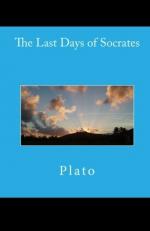
|
| Name: _________________________ | Period: ___________________ |
This test consists of 15 multiple choice questions and 5 short answer questions.
Multiple Choice Questions
1. How did Phaedo describe Socrates' execution?
(a) Unfair.
(b) Horrifying.
(c) Peaceful.
(d) Heart-wrenching.
2. Who took the young woman home when she was overcome with emotion?
(a) Simmias.
(b) Crito.
(c) Plato.
(d) Phaedo.
3. In what area of thought did the Pythagorean school excel?
(a) Mathematics.
(b) Music.
(c) Philosophy.
(d) All answers are correct.
4. What is the term for realizing that one's expectations are too high?
(a) Disgruntled.
(b) Dystopia.
(c) Dysphasia.
(d) Disillusionment.
5. What did Crito offer Socrates?
(a) A more comfortable place to spend his final days.
(b) An overturned sentence.
(c) A safe place to escape to.
(d) Money.
6. What concept does Tarrant label as "Christian," which he says the Greeks did not possess?
(a) Altruism.
(b) Sacraments.
(c) Immortality.
(d) Baptism.
7. What new activity did Socrates try while in prison?
(a) Singing.
(b) Writing poetry.
(c) Writing down some of his dialogues.
(d) Meditating.
8. What did Socrates expect when he passed into the Underworld, according to his dialogue with Crito?
(a) He expects to be judged.
(b) He expects to be reborn into another life.
(c) He expects to have all his questions answered.
(d) He expects to meet his friends who have passed before him.
9. What is the theory of "Idealism" in philosophy?
(a) The gods are the ideal forms of human qualities.
(b) Ideas and thoughts have their own existence.
(c) Ideas are constant and unchanging.
(d) Physical objects are based upon ideal forms.
10. According to Socrates, what do mislogic and misanthropy have in common?
(a) Not having enough social interactions.
(b) Unrealistic expectations.
(c) Not exercising one's intellect.
(d) A lack of self-confidence.
11. Which is the longest of the four dialogues?
(a) The Euthyphro.
(b) The Phaedo.
(c) The Apology.
(d) The Crito.
12. According to Tarrant, what is one modern debate which is similar in nature to the issues in the "Phaedo"?
(a) Reincarnation.
(b) Capital punishment.
(c) Intelligent Design.
(d) Nature vs. nurture.
13. According to Tarrant, what parts of a person did the Greeks believe persisted through death?
(a) Their thoughts.
(b) Their communicative powers.
(c) Their emotions.
(d) All answers are correct.
14. What theory did the Pythagoreans have about the human soul?
(a) They felt that the soul only lasted as long as the body did.
(b) They didn't have a theory about the human soul.
(c) They didn't believe in the concept of the soul.
(d) They felt that the soul was eternal and unchanging.
15. Why did Socrates ask Crito to be cautious?
(a) So that the guards wouldn't overhear them.
(b) So that Crito didn't implicate himself.
(c) So that the two could determine their own, and one another's, beliefs about what is just.
(d) So that Socrates' friends didn't discover his escape plot.
Short Answer Questions
1. What did Crito say about Socrates' dream?
2. Who was the young woman at Socrates' execution?
3. What metaphor does Tarrant use to describe the different mentalities in the Phaedo?
4. Why did Socrates insist on going through with his sentence?
5. When did Socrates' dialogue with Crito take place?
|
This section contains 563 words (approx. 2 pages at 300 words per page) |

|




